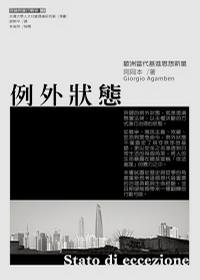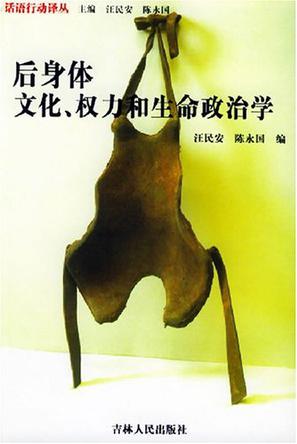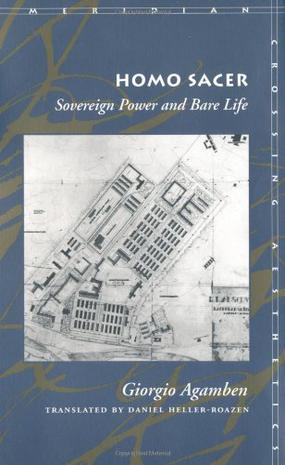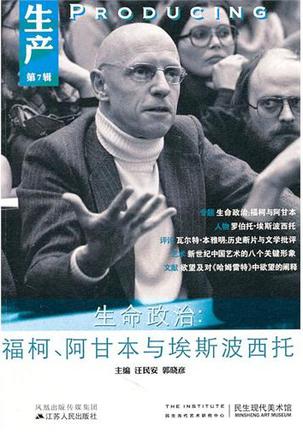-

例外狀態
所謂的例外狀態,就是透過懸置法律(憲法),用不受法律限制的措施進行治理的狀態。這彷彿是一個無法的狀態,生命被棄置、驅逐於法律之外,即成為赤裸的生命。 傅柯將自十八世紀起,透過人口學、統計學、公共衛生、都市計畫等新興知識─權力,將人民當作生物性的人口加以計算與調節的一整套治理技術,稱之為「生命政治」。這是人類的生物性生命首度成為政治關注對象的開始。相對於傳統主權「殺生」的死亡權利,這種新的生命權力關注的是養育國家的人口素質。自此政治權力對於人的生命的作用不再僅止於死亡的威嚇,而是全面滲透到整個生命歷程之中。 根據卡爾.施密特的論點:「主權者就是決斷例外狀態之人」,主權者擁有決斷例外狀態的權力,可以隨時撤回對於裸命的政治與法律保護,公民的身分與權利隨時可被棄於無法之境。對於阿岡本而言,生命政治的現代特徵並不如傅柯所說,是將生命納入政治,而是將生命排除在政治之外。相較於傅柯式的「生物生命走入政治」的生命政治提法,阿岡本反過來問,生命如何被政治棄置,而成為赤裸的生命?從這個觀點來看,主權並不直接殺生,而是「放生」,將其逐出人類社群之外,成為裸命。這個問題意識承繼自鄂蘭對難民潮的反思:不被國家承認,喪失公民身分與法律保障的難民,正是僅以其生物上屬性而被歸屬於人類。 阿岡本所強調的是,例外狀態已非例外,而逐漸成為常態,「例外狀態已經成為規則」。現代社會誕生了一群「赤裸人」,指沒有受到政治權利與法律保護的生命狀態,這樣的生命狀態,並非只是被法律排拒在外的少數人所面臨的特殊處境,而是生活在現代國家中的所有人所面對的一般狀況。在常態化的例外狀態中,當代公民的生存模式不是自由主義設定的自主個人,而是納粹集中營裡的猶太人,或是反恐拘留營中的穆斯林,一種赤裸狀態;國家則是恐怖主義的變體,並以訴諸例外狀態來避免失序與維持秩序。 -

The Birth of Biopolitics
Picador is proud to publish the sixth volume in Foucault's prestigious, groundbreaking series of lectures at the Collège de France from 1970 to 1984 . The Birth of Biopolitics continues to pursue the themes of Foucault's lectures from Security, Territory, Population. Having shown how eighteenth-century political economy marks the birth of a new governmental rationality--seeking maximum effectiveness by governing less and in accordance with the naturalness of the phenomena to be governed--Michel Foucault undertakes a detailed analysis of the forms of this liberal governmentality. In a direct and conversational tone, this book raises questions of political philosophy and social policy that are at the heart of current debates about the role and status of neo-liberalism in twentieth century politics. -

生命本身的政治
几百年来,医学致力于医治病变。但是今天,常态本身可以进行医学改进。医学现在具备了对身体和头脑的分子理解,具备了在分子、细胞和基因层面上操控基本生命过程的新技术,现在它试图控制人的生命过程。本书仔细研究了生命科学和生物医学的近期发展,这些发展使得医学、人类生命和生物技术普遍政治化。 作者尼古拉斯•罗斯避免了大众科学的炒作和大多数社会科学的悲观情绪,分析了当前的分子生命政治、基因组学、神经科学、药理学和精神药理学的发展,探讨了它们是如何影响种族政治、犯罪控制和精神病学的。罗斯在书中不仅分析了生物医学从进行治疗到管理生命的转变、新近对治疗疾病易感性而不是疾病的强调、我们对病人的理解出现的变化,还讨论了新的医疗行动主义形式的出现、生命资本的兴起和生命权力的变化。他认为:“这些发展对我们认为我们是谁,以及我们想成为什么人产生了深远的影响。” -

后身体
自从尼采和福柯以后,身体日渐成为当代理论的一个焦点,成为刻写历史痕迹的一个媒介,文化、权力、政治在这里展开了歧异的纷争。而身体不仅仅是被动的刻写机器,它有时成为一股积极主动的爆发性力量。这种两重性使身体和包围它的社会语境存在着一种复杂的关系。本书收集的论文从各个方面对这一关系进行了探讨,在德勒兹、鲍德里亚、齐泽克、朱迪丝、巴特勒等人的论述中重新打开了身体的秘密。而且,福柯的论述或隐或现地几乎贯穿在每一篇论文中。 -

Homo Sacer
The work of Giorgio Agamben, one of Italy's most important and original philosophers, has been based on an uncommon erudition in classical traditions of philosophy and rhetoric, the grammarians of late antiquity, Christian theology, and modern philosophy. Recently, Agamben has begun to direct his thinking to the constitution of the social and to some concrete, ethico-political conclusions concerning the state of society today, and the place of the individual within it. In "Homo Sacer, " Agamben aims to connect the problem of pure possibility, potentiality, and power with the problem of political and social ethics in a context where the latter has lost its previous religious, metaphysical, and cultural grounding. Taking his cue from Foucault's fragmentary analysis of biopolitics, Agamben probes with great breadth, intensity, and acuteness the covert or implicit presence of an idea of biopolitics in the history of traditional political theory. He argues that from the earliest treatises of political theory, notably in Aristotle's notion of man as a political animal, and throughout the history of Western thinking about sovereignty (whether of the king or the state), a notion of sovereignty as power over "life" is implicit. The reason it remains merely implicit has to do, according to Agamben, with the way the sacred, or the idea of sacrality, becomes indissociable from the idea of sovereignty. Drawing upon Carl Schmitt's idea of the sovereign's status as the exception to the rules he safeguards, and on anthropological research that reveals the close interlinking of the sacred and the taboo, Agamben defines the sacred person as one who can be killed and yet not sacrificed--a paradox he sees as operative in the status of the modern individual living in a system that exerts control over the collective "naked life" of all individuals. -

生产(第7辑)
《生产(第7辑):生命政治:福柯、阿甘本与埃斯波西托》讲述了对于“生产”的关注,源自马克思主义传统,正是在生产环节,马克思发现了资本增殖的秘密。马克思之后,“生产”获得更丰富的内涵:文化领域是知识生产,精神领域是欲望生产,政治领域是权力生产,社会变成一个巨大的生产机器——而所谓“消费社会”不过是它的一个反讽性注释。“生产”,成为诊断当代社会的关键词。另一方面,“生产”这个词对于今日中国人而言似乎别具意味:我们曾经身陷“生产”之笼,如今,我们期待这个迷失在历史深处的词语重新获得活力。当然,词语自有其命运,我们所能做的也只是邀请。最后,需要指出的是,“生产”的内在语义,就是生成,流变,活力,它符合当代知识分子的气质:永不停息地思考和批判。正是在这个意义上,“生产”是批判和思想的基本特征。